大学体验英语综合教程4_课文原文
大学体验英语综合教程4 Unit2课文翻译及课后答案
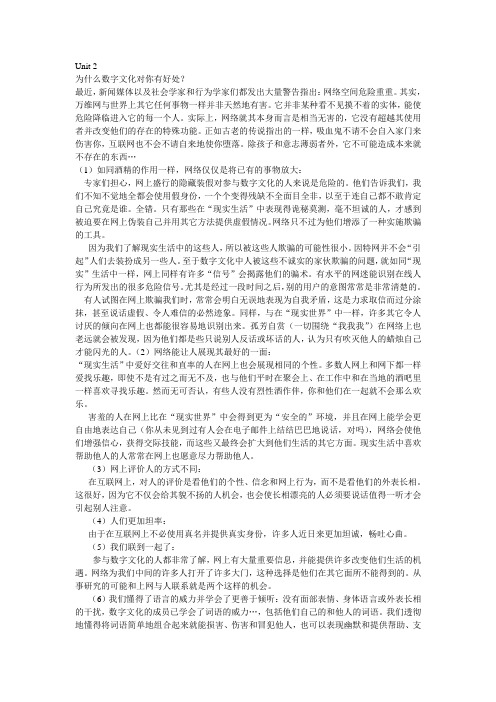
Unit 2为什么数字文化对你有好处?最近,新闻媒体以及社会学家和行为学家们都发出大量警告指出:网络空间危险重重。
其实,万维网与世界上其它任何事物一样并非天然地有害。
它并非某种看不见摸不着的实体,能使危险降临进入它的每一个人。
实际上,网络就其本身而言是相当无害的,它没有超越其使用者并改变他们的存在的特殊功能。
正如古老的传说指出的一样,吸血鬼不请不会自入家门来伤害你,互联网也不会不请自来地使你堕落。
除孩子和意志薄弱者外,它不可能造成本来就不存在的东西…(1)如同酒精的作用一样,网络仅仅是将已有的事物放大:专家们担心,网上盛行的隐藏装假对参与数字文化的人来说是危险的。
他们告诉我们,我们不知不觉地全都会使用假身份,一个个变得残缺不全面目全非,以至于连自己都不敢肯定自己究竟是谁。
全错。
只有那些在“现实生活”中表现得诡秘莫测,毫不坦诚的人,才感到被迫要在网上伪装自己并用其它方法提供虚假情况。
网络只不过为他们增添了一种实施欺骗的工具。
因为我们了解现实生活中的这些人,所以被这些人欺骗的可能性很小。
因特网并不会“引起”人们去装扮成另一些人。
至于数字文化中人被这些不诚实的家伙欺骗的问题,就如同“现实”生活中一样,网上同样有许多“信号”会揭露他们的骗术。
有水平的网迷能识别在线人行为所发出的很多危险信号。
尤其是经过一段时间之后,别的用户的意图常常是非常清楚的。
有人试图在网上欺骗我们时,常常会明白无误地表现为自我矛盾,这是力求取信而过分涂抹,甚至说话虚假、令人难信的必然迹象。
同样,与在“现实世界”中一样,许多其它令人讨厌的倾向在网上也都能很容易地识别出来。
孤芳自赏(一切围绕“我我我”)在网络上也老远就会被发现,因为他们都是些只说别人反话或坏话的人,认为只有吹灭他人的蜡烛自己才能闪光的人。
(2)网络能让人展现其最好的一面:“现实生活”中爱好交往和直率的人在网上也会展现相同的个性。
多数人网上和网下都一样爱找乐趣,即使不是有过之而无不及,也与他们平时在聚会上、在工作中和在当地的酒吧里一样喜欢寻找乐趣。
大学体验英语综合教程4 unit 2 Passage B Cultural Differences
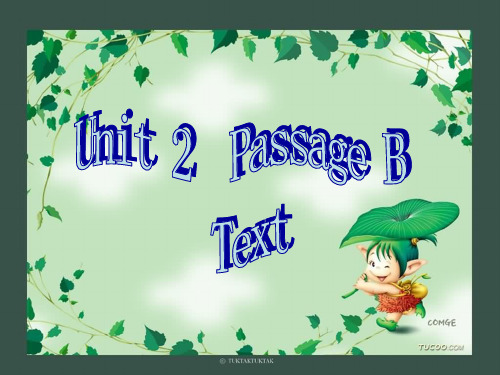
letting the world know that in Russia, the polite thing is to peel the bananas for the ladies. Sometime during my third trip I was politely disabused of my notion. Reading question 3 “Oh no, Grigorii Davidovich,” a Russian graciously kindly corrected me. “In Russia, when a man peels a banana for a lady it means he has a romantic interest in her.” How embarrassed I felt. And here I had been proudly telling everyone about this tidbit of cultural understanding. 有些教训只有通过这种尴尬的方式才能吸取。 Certain lessons have to be learned the hard way. Some well meaning articles and presentations on cultural differences have a potential to do more harm than good and may not be as amusing. They present, like my bananas, too many generalizations or quite a d现方式做保护处理对用户上传分享的文档内容本身不做任何修改或编辑并不能对任何下载内容负责
全新版大学英语综合教程4课文参考译文
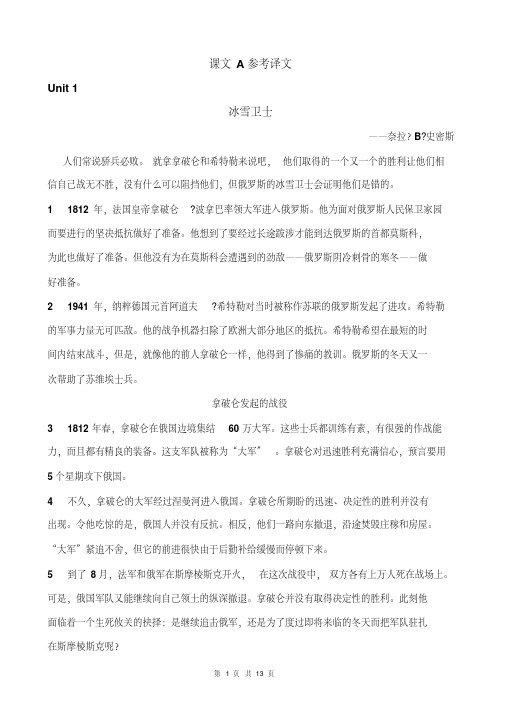
课文A参考译文Unit 1冰雪卫士——奈拉?B?史密斯人们常说骄兵必败。
就拿拿破仑和希特勒来说吧,他们取得的一个又一个的胜利让他们相信自己战无不胜,没有什么可以阻挡他们,但俄罗斯的冰雪卫士会证明他们是错的。
1 1812年,法国皇帝拿破仑?波拿巴率领大军进入俄罗斯。
他为面对俄罗斯人民保卫家园而要进行的坚决抵抗做好了准备。
他想到了要经过长途跋涉才能到达俄罗斯的首都莫斯科,为此也做好了准备。
但他没有为在莫斯科会遭遇到的劲敌——俄罗斯阴冷刺骨的寒冬——做好准备。
2 1941年,纳粹德国元首阿道夫?希特勒对当时被称作苏联的俄罗斯发起了进攻。
希特勒的军事力量无可匹敌。
他的战争机器扫除了欧洲大部分地区的抵抗。
希特勒希望在最短的时间内结束战斗,但是,就像他的前人拿破仑一样,他得到了惨痛的教训。
俄罗斯的冬天又一次帮助了苏维埃士兵。
拿破仑发起的战役3 1812年春,拿破仑在俄国边境集结60万大军。
这些士兵都训练有素,有很强的作战能力,而且都有精良的装备。
这支军队被称为“大军”。
拿破仑对迅速胜利充满信心,预言要用5个星期攻下俄国。
4 不久,拿破仑的大军经过涅曼河进入俄国。
拿破仑所期盼的迅速、决定性的胜利并没有出现。
令他吃惊的是,俄国人并没有反抗。
相反,他们一路向东撤退,沿途焚毁庄稼和房屋。
“大军”紧追不舍,但它的前进很快由于后勤补给缓慢而停顿下来。
5 到了8月,法军和俄军在斯摩棱斯克开火,在这次战役中,双方各有上万人死在战场上。
可是,俄国军队又能继续向自己领土的纵深撤退。
拿破仑并没有取得决定性的胜利。
此刻他面临着一个生死攸关的抉择:是继续追击俄军,还是为了度过即将来临的冬天而把军队驻扎在斯摩棱斯克呢?6 拿破仑决定冒险向远在448公里之外的莫斯科进发。
1812年9月7日,法俄两军在鲍罗季诺展开激烈的战斗,此地在莫斯科以西112公里外。
夜幕降临时,法军和俄军分别有3万和4.4万名士兵的死伤。
7 俄国军队再次撤退到安全的地方。
大学体验英语综合教程4课文翻译
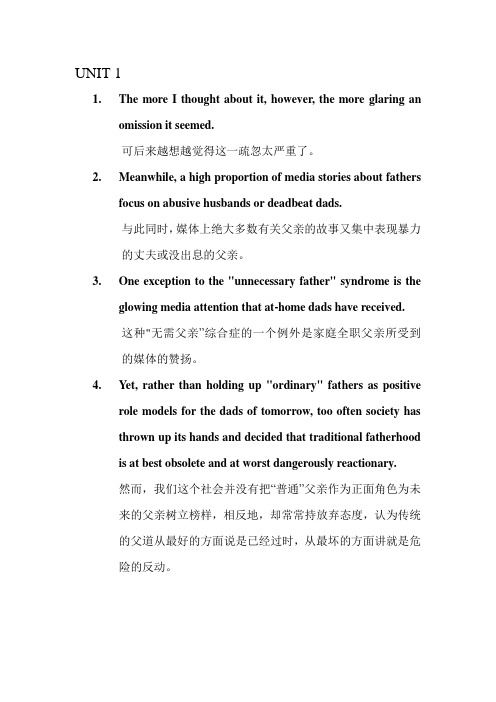
1.The more I thought about it, however, the more glaring anomission it seemed.可后来越想越觉得这一疏忽太严重了。
2.Meanwhile, a high proportion of media stories about fathersfocus on abusive husbands or deadbeat dads.与此同时,媒体上绝大多数有关父亲的故事又集中表现暴力的丈夫或没出息的父亲。
3.One exception to the "unnecessary father" syndrome is theglowing media attention that at-home dads have received.这种"无需父亲”综合症的一个例外是家庭全职父亲所受到的媒体的赞扬。
4.Yet, rather than holding up "ordinary" fathers as positiverole models for the dads of tomorrow, too often society has thrown up its hands and decided that traditional fatherhood is at best obsolete and at worst dangerously reactionary.然而,我们这个社会并没有把“普通”父亲作为正面角色为未来的父亲树立榜样,相反地,却常常持放弃态度,认为传统的父道从最好的方面说是已经过时,从最坏的方面讲就是危险的反动。
1.The truth of the matter is that the Web is no more inherentlydangerous than anything else in the world.其实,万维网并不比世界上其它任何事物更为天然地有害。
大学体验英语综合教程4unit
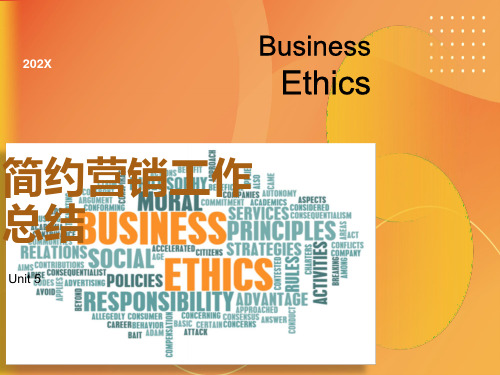
1
2
Review
Line 19: The quest for profit stands in opposition to everything that is moral, fair, decent, and charitable.
追求利润就会和任何道德,公平,体面和仁慈的事情背道而驰.
At the meeting, the two sides had a hot debate. The reformers put forward many reforming measures, but conservatives were in opposition to the proposed changes.
Contemporary 当代的Ruthless 冷酷的Downright 明显的Wickedness 邪恶的Portrayal 描述,肖像Immortal 不朽的Utility 利用Compassion 同情Commendable 称赞的Commencement 毕业典礼Testimonial 证明书Derail 毁坏Capture 捕获Quip 妙语
General Reading (Para 9-10)
How do the contemporary media define business?
01
What do Stephen Covery and Tom Peter think of business morality?
02
Get away with
Unit 5
202X
简约营销工作总结
Look at the following pictures and describe: What is happening? Can you describe to your partner any story related to the picture?What do they imply?
大学体验英语项目组《大学体验英语综合教程(4)》第3版学习指南【词汇短语+课文精解+全文翻译+练习答

大学体验英语项目组《大学体验英语综合教程(4)》(第3版)学习指南Unit2一、词汇短语Passage Aorphanage[]n.孤儿院;孤儿身份【例句】I founded an orphanage last year and feel obliged to take care of those children.去年我创办了一个孤儿院。
我觉得有责任去照顾那些小孩。
sin[]n.罪,罪恶v.犯罪【例句】I guess ignorance must be a sin.我认为无知是一种罪。
【助记】s(形似:蛇)+in(里面)→心如毒蛇→罪孽【派生】sinner n.罪人;有错者linguistic[]adj.语言上的,语言学上的【例句】The ability to write is a supreme test of linguistic competence.写作能力是对语言能力的最高形式的测试。
hale and hearty精神充沛的,矍铄的;老当益壮的,健壮的glamour[]n.魔力,魅力;妖艳vt.迷惑【例句】Do you still think there’s glamour in the advertising business?你是否还认为广告具有诱惑力?【词组】cast a glamour over使迷住,迷住(某人);给…增添几分魅力【助记】glamour音“哥来摸”→妹妹有魅力,哥来摸。
【派生】glamorous adj.迷人的,富有魅力的impute[]vt.归罪于,归咎于;嫁祸于【例句】Why do you impute selfish motives to her?你为什么说她的动机是自私的?ruddy[]adj.红的;红润的adv.极度;非常vt.使变红vi.变红【例句】That hunter has a ruddy face because he is outdoors so much.那个猎人脸色红润,因为他长期待在户外。
大学体验英语综合教程4课文翻译
大学体验英语综合教程4课文翻译大学体验英语4课文翻译教学及科研资料2011-03-21 09:37:20 阅读212 评论0 字号:大中小订阅 .无名英雄:职业父亲意味着什么?在我们的孪生女儿出生后的第一次“约会”时,我和丈夫一起去看了一部名为《玩具故事》的电影,我们很喜欢这部片子,但随后我丈夫问道:“父亲在哪儿呢?”起初我还认为因为一个小小的失误而批评一部很吸引人的家庭影片似乎是太褊狭了。
可后来越想越觉得这一疏忽太严重了。
父亲不仅没有出现,他甚至没有被提到--尽管家中有婴儿,说明他不可能离开太长时间。
影片给人的感觉是,父亲出现与否似乎是个极次要的细节,甚至不需要做任何解释。
新闻媒体倾向于把父亲边缘化,这只是一个例子,它反映了在美国发生的巨大的社会变化。
大卫·布兰肯霍恩在《无父之国》一书中将这种倾向称之为“无需父亲”观念。
职业母亲(我想这应是与无职业母亲相对而言的)奋斗的故事从媒体上无尽无休地轰击着我们。
与此同时,媒体上绝大多数有关父亲的故事又集中表现暴力的丈夫或没有出息的父亲。
看起来似乎父亲惟一值得人们提及的时候是因为他们做家务太少而受到指责的时候(我怀疑这一说法的可靠性,因为“家务”的定义中很少包括打扫屋顶的雨水沟,给汽车换机油或其他一些典型的由男人做的事),或者是在他们去世的时候。
当布兰肯霍恩先生就“顾家的好男人”一词的词义对父亲们进行调查时,许多父亲都回答这一词语只有在葬礼上听到。
这种“无需父亲”综合症的一个例外是家庭全职父亲所受到的媒体的赞扬。
我并非暗指这些家庭全职父亲做出的承诺不值得人们的支持,我只想指出正在实际生效的双重标准:家庭全职父亲受到人们的赞扬,而家庭全职母亲和养家糊口的父亲,所得到文化上的认同却很少,甚至完全得不到。
我们用来讨论父亲的角色(即没出息的父亲)的话语本身就显示出人们对大多数男人默默无闻而自豪地履行对家庭承担的责任缺乏赏识。
我们几乎从来没听到“职业父亲”这一说法,在人们呼吁应该给予工作者在工作地点上更大的灵活性时,很少有人认为这种呼吁不但适用于女子,同样也适用于男子。
大学体验英语综合教程4重要课文翻译课文翻译
Unit1 PA无名英雄:职业父亲意味着什么?在我们的孪生女儿出生后的第一次"约会”时,我和丈夫一起去看了一部名为《玩具故事》的电影。
我们很喜欢这部片子,但随后我丈夫问道:"父亲在哪儿呢?”起初我还认为因为一个小小的失误而批评一部很吸引人的家庭影片似乎是太偏狭了。
可后来越想越觉得这一疏忽太严重了。
父亲不仅没有出现,他甚至没有被提到——尽管家中有婴儿,说明他不可能离开太长时间。
影片给人的感觉是,父亲出现与否似乎是个极次要的细节,甚至不需要做任何解释。
新闻媒体倾向于把父亲的边缘化,这只是一个例子,它反映了在美国发生的巨大的社会变化。
大卫?布兰肯霍恩在《无父之国》一书中将这种倾向称之为"无需父亲”观念。
职业母亲(我想这应是与无职业母亲相对而言的)奋斗的故事从媒体上无尽无休地轰击着我们。
与此同时,媒体上绝大多数有关父亲的故事又集中表现暴力的丈夫或没出息的父亲。
看起来似乎父亲惟一值得人们提及的时候是因为他们做家务太少而受到指责的时候(我怀疑这一说法的可靠性,因为"家务”的定义中很少包括打扫屋顶的雨水沟、给汽车换机油或其它一些典型地由男人们做的事),或者是在他们去世的时候。
当布兰肯霍恩先生就"顾家的好男人”一词的词义对父亲们进行调查时,许多父亲都回答这一词语只有在葬礼上听到。
这种"无需父亲”综合症的一个例外是家庭全职父亲所受到的媒体的赞扬。
我并非暗指这些家庭全职父亲作出的承诺不值得人们的支持,我只是想指出在实际生效的双重标准:家庭全职父亲受到人们的赞扬,而家庭全职母亲和养家活口的父亲,所得到文化上的认同却很少,甚至完全得不到。
我们用来讨论父亲角色(即没出息的父亲)的话语本身就显示出人们对大多数男人默默无闻而自豪地履行对家庭承担的责任缺乏赏识。
我们几乎从来没听到"职业父亲”这一说法,在人们呼吁应该考虑给予工作者在工作地点上更大的灵活性时,很少有人认为这种呼吁不但适用于女子,同样也适应于男子。
大学体验英语综合教程4课文翻译和课后答案
大学体验英语综合教程4课文翻译和课后答案-CAL-FENGHAI.-(YICAI)-Company One1Unit 1课后答案Read and think 31~5 BADDCRead and think 41.media2.images3.abusive4.fulfilling5.recognition6.status7.stresses8.aware9.deserveRead and complete 51. obligation2. applauded3. fulfilled4. mirror5. flexibility6. devalue7. striving8. entailed9. supposedly10. ConsequentlyRead and complete 61.referred to as2.at best3.by the same token4.at large5.held up...asRead and translate 81.随着职务的提升,他担负的责任也更大了。
With his promotion,he has taken on greater responsibilities.2.他感到他没有必要再一次对约翰承担这样的责任了。
He felt he did not have to make such a commitment to John any more.3.闲暇时玛丽喜欢外出购物,与她相反,露西却喜欢呆在家里看书。
Mary likes to go shopping in her spare time, as opposed to Lucy,who prefers to stay at home reading.4.说好听一点,可以说他有抱负,用最糟糕的话来说,他是一个没有良心或没有资格的权力追求者。
At best he’s ambitious,and at worst a power-seeker without conscience or qualifications.5.我们已经尽全力想说服他,但是却毫无进展。
大学体验英语综合教程4课文翻译和课后答案
⼤学体验英语综合教程4课⽂翻译和课后答案⼤学体验英语综合教程4课后答案Unit 1课后答案Read and think 31~5 BADDCRead and think 41.media2.images3.abusive4.fulfilling5.recognition6.status7.stresses8.aware9.deserveRead and complete 51. obligation2. applauded3. fulfilled4. mirror5. flexibility6. devalue7. striving8. entailed9. supposedly10. ConsequentlyRead and complete 61.referred to as2.at best3.by the same token4.at large5.held up...asRead and translate 81.随着职务的提升,他担负的责任也更⼤了。
With his promotion,he has taken on greater responsibilities.2.他感到他没有必要再⼀次对约翰承担这样的责任了。
He felt he did not have to make such a commitment to John any more.3.闲暇时玛丽喜欢外出购物,与她相反,露西却喜欢呆在家⾥看书。
Mary likes to go shopping in her spare time, as opposed to Lucy,who prefers to stay at home reading.4.说好听⼀点,可以说他有抱负,⽤最糟糕的话来说,他是⼀个没有良⼼或没有资格的权⼒追求者。
At best he’s ambitious,and at worst a power-seeker without conscience or qualifications.5.我们已经尽全⼒想说服他,但是却毫⽆进展。
- 1、下载文档前请自行甄别文档内容的完整性,平台不提供额外的编辑、内容补充、找答案等附加服务。
- 2、"仅部分预览"的文档,不可在线预览部分如存在完整性等问题,可反馈申请退款(可完整预览的文档不适用该条件!)。
- 3、如文档侵犯您的权益,请联系客服反馈,我们会尽快为您处理(人工客服工作时间:9:00-18:30)。
Unit1. The Unsung Heroes: What About Working DadsOn our first "date" after our twin daughters were born, my husband and I went to see the movie Toy Story. We enjoyed it, but afterward my husband asked, "Where was the dad" At first, it seemed petty to criticize an entertaining family movie because of one small point. The more I thought about it, however, the more glaring an omission it seemed. Not only was dad not around, he wasn't even mentioned - despite the fact that there was a baby in the family, so dad couldn't have been that long gone. It was as if the presence- or absence - of a father is a minor detail, not even requiring an explanation.This is only one example of the media trend toward marginalizing fathers, which mirrors enormous social changes in the United States. David Blankenhorn, in his book Fatherless America, refers to this trend as the "unnecessary father" concept.We are bombarded by stories about the struggles of working mothers (as opposed to non-working mothers, I suppose). Meanwhile, a high proportion of media stories about fathers focus on abusive husbands or deadbeat dads. It seems that the only time fathers merit attention is when they are criticized for not helping enough with the housework (a claim that I find dubious anyway, because the definition of "housework" rarely includes cleaning the gutters, changing the oil in the car or other jobs typically done by men) or when they die. When Mr. Blankenhorn surveyed fathers about the meaning of the term "good family man," many responded that it was a phrase they only heard at funerals. One exception to the "unnecessary father" syndrome is the glowing media attention that at-home dads have received. I do not mean to imply that at-home dads do not deserve support for making this commitment. I only mean to point out the double standard at work when at-home dads are applauded while at-home mothers and breadwinner fathers are given little, if any, cultural recognition.The very language we use to discuss men's roles ., deadbeat dads) shows a lack of appreciation for the majority of men who quietly yet proudly fulfill their family responsibilities. We almost never hear the term "working father," and it is rare that calls for more workplace flexibility are considered to be for men as much as for women. Our society acts as if family obligations are not as important to fathers as they are to mothers - as if career satisfaction is what a man's life is all about.Even more insulting is the recent media trend of regarding at-home wives as "status symbols" - like an expensive car - flaunted by the supposedly few men who can afford such a luxury. The implication is that men with at-home wives have it easier than those whose wives work outside the home because they have the "luxury" of a full-time housekeeper. In reality, however, the men who are the sole wage earners for their families suffer a lot of stresses. The loss of a job - or even the threat of that happening - is obviously much more difficult when that job is the sole source of income for a family. By the same token, sole wage earners have less flexibility when it comes to leaving unsatisfying careers because of the loss of income such a job change entails. In addition, many husbands work overtime or second jobs to make more needed money for their families. For these men, it is the family that the job supports that makes it all worthwhile. It is the belief that having a mother at home is important to the children, which makes so many men gladly take on the burden of being a sole wage earner.Today, there is widespread agreement among researchers that the absence of fathers from households causes serious problems for children and, consequently, for society at large. Yet, rather than holding up "ordinary" fathers as positive role models for the dads of tomorrow, too often societyhas thrown up its hands and decided that traditional fatherhood is at best obsolete and at worst dangerously reactionary. This has left many men questioning the value of their role as fathers.As a society, we need to realize that fathers are just as important to children as mothers are - not only for financial support, but for emotional support, education and discipline as well. It is not enough for us merely to recognize that fatherlessness is a problem - to stand beside the grave and mourn the loss of the "good family man" and then try to find someone to replace him (ask anyone who has lost a father though death if that is possible). We must acknowledge how we have devalued fatherhood and work to show men how necessary, how important they are in their children's lives.Those fathers who strive to be good family men by being there every day to love and support their families - those unsung heroes - need our recognition and our thanks for all they do. Because they deserve it.Unit2. Why Digital Culture Is Good for YouThe news media, along with social and behavioral scientists, have recently sent out a multitude of warnings about the many dangers that await us out there in cyberspace. The truth of the matter is that the Web is no more inherently dangerous than anything else in the world. It is not someamorphous entity capable of inflicting harmful outcomes on all who enter. In fact, in and of itself, the Web is fairly harmless. It has no special power to overtake its users and alter their very existence. Like the old tale that the vampire cannot harm you unless you invite it to cross your threshold, the Internet cannot corrupt without being invited. And, with the exception of children and the weak-willed, it cannot create what does not already exist...(1) Like alcohol, the Web simply magnifies what is already there: Experts are concerned that the masking that goes on online poses a danger for everyone who is a part of the Digital Culture. Before we know it, the experts tell us, we will all use fake identities, become fragmented, and will no longer be sure of just who we are. Wrong. The only people who feel compelled to mask, and otherwise misrepresent themselves online are the same people who are mysterious and unfrank in "real life"...the Net just gives them one more tool to practice their deceit.As for the rest of us, getting taken in by these people is a low probability. We know who these folks are in the "real world". The Internet does not "cause" people to disguise as something they are not. As for the Digital Culture getting cheated by these dishonest folks, well, there are just as many "cues" online to decipher deception as there are in the "real world". The competent WebHead can recognize many red flags given off by the online behavior of others. Oftentimes the intentions of fellow users is crystal clear, especially over time.When someone is trying to deceive us online, inconsistencies, the essence that they are trying "too hard" or are just plain unbelievable, often come through loud and clear. Likewise, just like in the "real world", a host of other unacceptable tendencies can be readily recognized online. Narcissism (it's all about "meeeee"), those people who have nothing but negativity or unpleasant things to say about others, and those who feel compelled to undermine others and who think they must blow out the other guys' candles in order for their own to shine can be spotted a cybermile away.(2) The Web can bring out the best in people: Gregarious, frank folks in "real life" usually carry these same traits over to their online life. Most are just as fun-loving online if not more so, as they are at a party, at work, or at the local bar. Though admittedly, some are not quite as much fun to be around without a stiff drink.Shy folks have a "safer" environment online than in the "real world" and can learn to express themselves more freely on the Net (you've never seen anyone stutter on e-mail, have you) allowing them to gain confidence and communication skills that can eventually spill over into other aspects of their lives. Helpful people in "real life" are often just as willing to come to someone's assistance online as anywhere else.(3) People are judged differently on the Web: On the Internet people are judged by their personality, beliefs and online actions, NOT by their physical appearance. This is good. It not only gives ugly folks an aid, but causes Beautiful People to have to say something worth listening to in order to get attention.(4) People open up more: Many people are opening up a whole lot more these days since they are not required to use their real name and provide their real identity in the Internet.(5) We're connected: Members of the Digital Culture know full well that there is a wealth of important information and life-changing opportunities out there in cyberspace. The Web has opened doors for many of us that otherwise would never have been an option. Research possibilities and networking are just two such opportunities.(6) We Learn the Power of Words and to be Better Listeners: With no facial expressions, body language, or physical appearance to distract us, members of the Digital Culture have learned thepower of words ... both their own, and others'. We know very well how a simple string of words can harm, hurt and offend, or how they can offer humor, help, support and encouragement. Most experienced members of the online culture have learned to become wordsmiths, carefully crafting the words they use to convey exactly what they mean so as not to be misunderstood.Many of us have also learned to become far better listeners thanks to the Internet. Not only do we choose our words more carefully but we (especially those who communicate via email as opposed to chat rooms) are forced to wait until the other person finishes before we can speak or respond.Unit3. Big Myths About Copyright"If it doesn't have a copyright notice, it's not copyrighted." This was true in the past, but today almost all major nations follow the Berne copyright convention. For example, in the USA, almost everything created privately and originally after April 1, 1989 is copyrighted and protected whether it has anotice or not. The default you should assume for other people's works is that they are copyrighted and may not be copied unless you know otherwise. There are some old works that lost protection without notice, but frankly you should not risk it unless you know for sure.2) "If I don't charge for it, it's not a violation." False. Whether you charge can affect the damages awarded in court, but that's the main difference under the law. It's still a violation if you give it away - and there can still be serious damages if you hurt the commercial value of the property. There is an exception for personal copying of music, which is not a violation, though courts seem to have said that doesn't include wide-scale anonymous personal copying as Napster. If the work has no commercial value, the violation is mostly technical and is unlikely to result in legal action.3) "If it's posted to Usenet it's in the public domain." False. Nothing modern is in the public domain anymore unless the owner explicitly puts it in the public domain. Explicitly, as you have a note from the author/owner saying, "I grant this to the public domain."4) "My posting was just fair use!" The "fair use" exemption to .) copyright law was created to allow things such as commentary, parody, news reporting, research and education about copyrighted works without the permission of the author. That's important so that copyright law doesn't block your freedom to express your own works. Intent and damage to the commercial value of the work are important considerations. Are you reproducing an article from the New York Times because you couldn't find time to write your own story, or didn't want your readers to have to pay for the New York Times web site They aren't "fair use". Fair use is usually a short excerpt.5) "If you don't defend your copyright you lose it." - "Somebody has that name copyrighted!" False. Copyright is effectively never lost these days, unless explicitly given away. You also can't "copyright a name" or anything short like that, such as almost all titles. You may be thinking of trademarks, which apply to names, and can be weakened or lost if not defended. Like an "Apple" computer. Apple Computer "owns" that word applied to computers, even though it is also an ordinary word. Apple Records owns it when applied to music. Neither owns the word on its own, only in context, and owning a mark doesn't mean complete control.6)"If I make up my own stories, but base them on another work, my new work belongs to me." False. . Copyright law is quite explicit that the making of what are called "derivative works" - works based on or derived from another copyrighted work - is the exclusive province of the owner of the original work. This is true even though the making of these new works is a highly creative process. If you write a story using settings or characters from somebody else's work, you need that author's permission. 7)"They can't get me, defendants in court have powerful rights!" Copyright law is mostly civil law. If you violate copyright you would not be charged with a crime, but usually get sued.8) "Oh, so copyright violation isn't a crime or anything" Actually, recently in the USA commercial copyrightviolation involving more than 10 copies and value over $2500 was made a felony. So watch out. On the other hand, this is a fairly new, untested statute. In one case an operator of a pirate BBS that didn't charge was acquitted because he didn't charge, but congress amended the law to cover that. 9) "It doesn't hurt anybody - in fact it's free advertising." It's up to the owners to decide if they want the free ads or not. If they want them, they will be sure to contact you. Don't rationalize whether it hurts the owners or not, ask them. Usually that's not too hard to do. Even if you can't think of how the author or owner gets hurt, think about the fact that piracy on the net hurts everybody who wantsa chance to use this wonderful new technology to do more than read other people's flamewars.10) "They e-mailed me a copy, so I can post it." To have a copy is not to have the copyright. All theE-mail you write is copyrighted. However, E-mail is not unless previously agreed. So you can certainly report on what E-mail you are sent, and reveal what it says. You can even quote parts of it to demonstrate. Frankly, somebody who sues over an ordinary message would almost surely get no damages, because the message has no commercial value, but if you want to stay strictly in the law, you should ask first. On the other hand, don't go nuts if somebody posts E-mail you sent them. If it was an ordinary non-secret personal letter of minimal commercial value with no copyright notice (like % of all E-mail), you probably won't get any damages if you sue them.Unit4The study of literature is not only civilized and civilizing —encompassing, as it does, philosophy, religion, the history of events and the history of ideas — but popular and practical. One-sixth of all those who receive bachelor’s degrees from the College of Arts and Sciences are English majors. These graduates qualify for a surprising range of jobs. Their experience puts the lie to the popular superstition that English majors must choose between journalism and teaching: in fact, English majors also receive excellent preparation for future careers in law, medicine, business, and governmentservice.Undergraduates looking forward to law school or medical school are often advised to follow a strict regimen of courses considered directly relevant to their career choices. Future law-school students are advised to take courses in political science, history, accounting, business administration — even human anatomy, and marriage and family life. Future medical school students are steered into multiple science courses —actually far more science courses than they need for entrance into medical school. Surprisingly, many law schools and medical schools indicate that such specialized preparation is not only unnecessary, but undesirable. There are no "pre-law" courses: the best preparation for law school — and for the practice of law — is that preparation which makes a student capable of critical thinking; of clear, logical self-expression; of sensitive analysis of the motives, the actions, and the thoughts of other human beings. These are skills which the study of English is designed to teach.Entrance into law school, moreover, generally requires a bachelor’s degree from an accredited institution, a minimum grade point average, and an acceptable score on the Law School Admission Test This test has three parts. The first evaluates skills in reading comprehension, in figure classification, and in the evaluation of written material. The second part of the test evaluates control of English grammar and usage, ability to organize written materials, and competence to edit. The third part evaluates the student’s general knowledge of literature, art, music, and the natural and social sciences. Clearly an undergraduate major in English is strong preparation for theAs for medical schools, the main requirement for admission is only thirty-two hours of science courses. This requirement is certainly no impediment to a major in English. Moreover many medical schools require a minimum score on the Medical College Admissions Test, another test which offers an advantage to the well-rounded liberal arts student. The evaluates four areas of competence: skill with synonyms, antonyms, and word association; knowledge of basic mathematics from fractions through solid geometry; general knowledge of literature, philosophy, psychology, music, art, and the social sciences; and familiarity with those fundamentals of biology, chemistry, and physics taught in high school and in introductory college courses. The English major with a solid, basic grounding in science is well prepared for this test and for medical school, where his or her skills in reading, analysis, interpretation, and precise communication will equip him or her to excel. The study and practice of medicine can only benefit from the insights into human behavior provided by the study of literature. Such insights are obviously also valuable to the student who plans a career in commerce. Such students should consider the advantages of an English major with an emphasis in business: this program is designed to provide a liberal education, as well as to direct preparation for a business career. The need for such a program is clear: graduates with merely technical qualifications are finding jobs in business, but often failing to hold them. Both the Wall Street Journal and the Journal of College Placement have reported that increasing numbers of graduates from reputable business schools find themselves drifting from one job or firm to another, unable to hold a position for longer than twelve months. Employers complain that these apparently promising young men and women are simply not competent communicators: because they are not sufficiently literate, they cannot absorb managerial training; they cannot make effective oral presentations; they cannot report progress or problems in their writing; they cannot direct other workers. Skill in analysis and communication is the essence of management.Consequently the English major with an emphasis in business is particularly well prepared for a future in business administration. Nearly four hundred companies in fields ranging from banking andinsurance to communications to manufacturing were asked whether they hired college graduates with degrees in English, even when those graduates lacked special training in the industry: Eighty-five percent of the companies said that they did. College graduates with degrees in English are working successfully in marketing, in systems engineering, in personnel management, in sales, in programming, in project design, and in labor relations.English majors are also at work in the thousand occupations provided by government at all levels. Consider, for example, the federal government—by a very wide margin, America’s biggest employer. In organizations ranging from the Marine Corps to the Bureau of Mines, from the Commerce Department to the National Park Service, the federal government employs a work force of nearly three million men and women. English majors may qualify for many of these jobs. Recently, 51 federal agencies were asked the same question: whether they hired college graduates with English degrees but without special job training, 88 percent of these federal employers said yes. The list of federal positions for which English majors may qualify ranges from Claims Examiner to Foreign Service Officer to Highway Safety Management Specialist. Again, those who seek positions of high reward and responsibility may be asked to take a test —the federal government uses the Professional and Administrative Career Examination, or to evaluate applicants for about 10,000 jobs each year — and again, the test focuses on language skills: comprehension, analysis, interpretation, the ability to see logical relationships between ideas, and the ability to solve problems expressed in words. Not surprisingly, competent English majors often receive very high scores on theIn short, a major in English is neither restricting nor impractical: the study of English is excellent preparation for professional life.Unit5. The Moral AdvantageHow to Succeed in Business by Doing the Right ThingAs for the moral advantage in business, of all places, everyone knows a modicum of ethics is called for in any business - you can't cheat your customers forever and get away with it. But wouldn't it be more advantageous if you actually could get away with it Profits would soar out of sight! Then you would really have an advantage, or so the thinking might go.The notion of seeking the moral advantage is a new way of thinking about ethics and virtue in business, an approach that does not accept the need for trade-offs between ambition and conscience. Far from obstructing the drive for success, a sense of moral purpose can help individuals and companies achieve at the highest - and most profitable - levels.Cynicism dominates our attitudes about what it takes to succeed in business. A common way of thinking about morality in business goes something like this:Ethical conduct is an unpleasant medicine that society forces down business people's throats to protect the public interest from business avarice.Morality gets in the way of the cold, hard actions truly ambitious Skepticism people must take to reach their goals.Moneymaking is inevitably tainted by greed, deceit, and exploitation.The quest for profits stands in opposition to everything that is moral, fair, decent, and charitable. Skepticism about moneymaking goes back a long way. The Bible warns that it's harder for a rich man to enter the kingdom of heaven than for a camel to pass through the eye of a needle. "Behind every great fortune," wrote French novelist Honoréde Balzac in the 1800s, "lies a great crime." British author G. K. Chesterton sounded the same theme in the early 20th century, noting that a businessman "is the only man who is forever apologizing for his occupation."The contemporary media often characterize business as nothing more than a self-serving exercise in greed, carried out in as corrupt and ruthless a manner as possible. In television and movies, moneymaking in business is tainted by avarice, exploitation, or downright villainy. The unflattering portrayals have become even more pointed over time. In 1969, the businessman in Philip Roth's Goodbye, Columbus advises the story's protagonist, "To get by in business, you've got to be a bit of a thief." He seems like a benignly wise, figure compared with Wall Street's 1980s icon, Gordon Gekko, whose immortal words were "Greed is good."Yet some important observers of business see things differently. Widely read gurus such as Stephen Covey and Tom Peters point to the practical utility of moral virtues such as compassion, responsibility, fairness, and honesty. They suggest that virtue is an essential ingredient in the recipe for success, and that moral standards are not merely commendable choices but necessary components of a thriving business career. This is a frequent theme in commencement addresses and other personal testimonials: Virtuous behavior advances a career in the long run by building trust and reputation, whereas ethical shortcomings eventually derail careers. The humorist Dorothy Parker captured this idea in one of her signature quips: "Time wounds all heels.So who's right --- those who believe that morality and business are mutually exclusive, or those who believe they reinforce one another Do nice guys finish last, or are those who advocate doing well by doing good the real winners Is the business world a den of thievery or a haven for upstanding citizens With colleagues Howard Gardner at Harvard University and Mihaly Csikszentmihalyi at Claremont Graduate University, I've examined this question by interviewing 40 top business leaders, such as McDonald's CEO Jack Greenberg and the late Washington Post publisher Katharine Graham, between 1998 and 2000 as part of our joint "Project on Good Work." We found that a strong sense of moral purpose not only promotes a business career but also provides a telling advantage in the quest to build a thriving enterprise. In fact, a sense of moral purpose stands at the center of all successful business innovations. Far from being a constraining force that merely keeps people honest and out of trouble, morality creates a fertile source of business motivation, inspiration, and innovation.This is different from the view of morality you'll encounter in a typical business-ethics course. It's so different that I now speak about moralities, in the plural, when discussing the role of virtue and ethics in business. Morality in business has three distinct faces, each playing its own special role in ensuring business success.Unit6. Is It Healthy to Be a Football SupporterWhy Fans Know the ScoreDie-hard football fans hit the heights when their team wins and reaches the depths of despair when they lose. Scientific studies show the love affair with a team may be as emotionally intense as the real thing, and that team clashes have gladiatorial power.What's going on Why do fervent fans have hormonal surges and other psychological changes while watching games Why does fans' self-esteem soar with victory and plummet in defeat, sometimes affecting their lives long afterwards Why do people feel so drawn to form such deep ties to teams Is avidly rooting for a team good or bad for your health You may find the answers surprising.THE FAN'S PERSONALITYPsychologists often portray die-hard fans as lonely misfits searching for self-esteem by identifying with a team,2 but a study suggests the opposite. It reveals that football fans suffer fewer bouts of。
